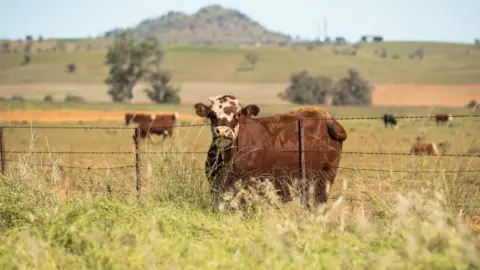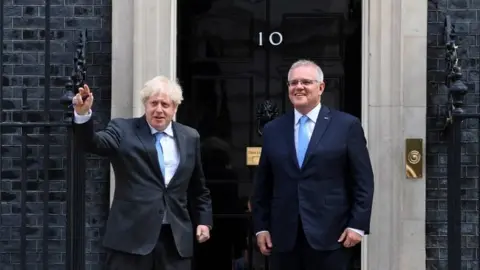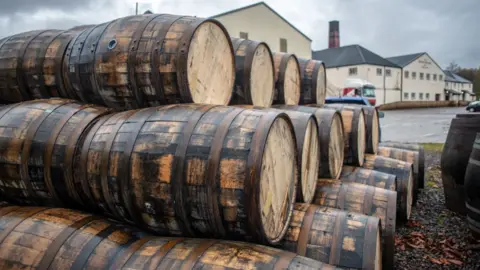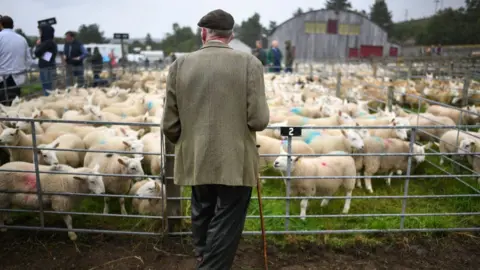Trading places: Answers sought on Australia trade deal

 Getty Images
Getty Images- It's a historic deal with Australia, but sketchy. And the lack of clarity will be with us for some time yet.
- Gainers can expect modest gains from the removal of 5% tariffs on goods such as whisky, biscuits and cars. Consumers in both countries may find goods becoming cheaper.
- On the losing side, British farming is alarmed - at the threat to markets and prices, at the prospects for further deals, and at the way this deal has been done, without scrutiny.
You could call it Brexit's "gap-year dividend". That rite of passage for affluent young Brits often takes them to Australia. They get the right to enter the jobs market Down Under, but until now, only after doing three months of farm work.
We're told there's some concern that the trade deal - struck with an elbow bump in Downing Street early (and simultaneously mid-evening) on Tuesday - is going to leave them with a shortage of grape and avocado pickers.
In much the same way, British youth can no longer pick up jobs in the European Union. And Scottish berry farmers lack the Romanians and Bulgarians who are no longer allowed to travel to the UK for visa-free work.
Trade deals are intended to make trading partners better off, and in general, over time, as a rule, other things being equal, they do. (An end to trade deals, such as Britain's place in Europe's trading bloc, does the opposite.)
 EPA
EPABut they have a habit of disrupting established trading patterns and business models. Gainers take time to secure those extra sales, while those who lose out make a much louder noise about it.
Having had 50 years of trade negotiation experience, that is why Australian ministers are selling this deal in terms of jobs and cheaper consumer goods, while UK ones have been on the back foot for months in response to concerns from Britain's farmers.
First, the gainers: in the case of Scotch whisky, a 5% Australian tariff hasn't stopped a rapid growth in sales to £130m per year.
The Scotch Whisky Association trade body reckons the cut in tariff is worth £6m per year. That's a modest gain by the industry's standards.
But chief executive Karen Betts is playing a longer game, for trade deals to reduce not only tariffs but other barriers to trade.
For instance, whisky is at a disadvantage to brandy on Australian shop shelves. And trade deals can include requirements of tough legal protections for brands, which are big issues for Scotch exporters.
 Getty Images
Getty Images(As an aside, a far bigger deal than the Australian one is the end, also today, to the 17-year trade dispute between the USA and EU over subsidies to Boeing and Airbus.
For 17 months, under President Trump, that resulted in a 25% tariff on exports of single malt Scotch whisky to the US.
The UK has been part of that dispute, and with Katherine Tai, America's chief trade negotiator, soon to arrive in London, she brings an expectation that the peace deal will extend to the UK.)
Other gainers could be those manufacturing shortbread to mining equipment.
The art of trade deals as they affect digital commerce is still evolving, and international trade secretary Liz Truss claims to have secured a good one for financial services. Public procurement opens up in both directions to companies bidding for work.
Export safeguards
The big loser? Agriculture. Possibly. Australians have been very keen to get access to the UK market, but talk as if it's not going to make that much difference while they're so busy selling to Asia.
Britain is attractive to them, they say, because it allows them to diversify away from dependence on their rocky relationship with China. In any case, there are costs to transporting meat halfway round the world.
So Scottish and other UK farmers are talking a canny game about the risks and prospects arising from this deal. First, they think prices will be dampened by imports produced on a much larger scale.
The import quota on sheep meat in year one goes from less than 8,000 tonnes of imports in 2019 to 25,000 tonnes.
 Getty Images
Getty ImagesThat ceiling (not always reached) then rises until it's eventually removed, while tariffs are reduced over 10 years. These can be as high as 50% on some meat imports into the UK and EU.
Farmers are yet to see the detail of safeguards on animal welfare and agricultural inputs such as pesticides, antibiotics and growth hormones, so they don't know how big a problem that could become in making British farming relatively uncompetitive.
Australia already produces export quality that meets European standards. It may continue to do so for British sales: we don't know yet.
"Safeguards" have been promised, but experience of Boris Johnson's handling of Brexit negotiations makes some people suspicious of what such promises are worth.
Premium cuts
Second, farmers fear the cumulative effect of the Australia deal being followed by others.
The New Zealand trade minister is in talks this week with Liz Truss, and he won't want to return to Wellington with a deal any less attractive to Kiwi farmers than Canberra's.
Both countries open up the prospect of the big prize for Ms Truss, in an eight-country deal with the Pacific Rim trade partnerships, also including Japan, Canada and Mexico.
Once all that is in place, to prove "Global Britain's" post-Brexit agility in world trade, the relatively small risk from Australia becomes a very much larger risk of British agriculture being undercut and put out of business.
Consider the possibilities if the USA joins that Pacific partnership, and wins the same right as Australians to bid into public procurement projects - such as, for instance, the health service.
And all that before it is clear how Westminster or devolved administrations are going to adapt farm subsidies in the medium to long term.
Upper hand
The battle between protection and a free market is being fought out in the Downing Street cabinet, and it seems the free traders have the upper hand.
The reverse side of that argument is that the British consumer gains from meat at lower (or at least dampened) prices. That can be a significant gain from trade.
And Liz Truss talks up the prospects of premium meat producers in Britain being able to sell into big growth markets in Asia, where growing prosperity brings growing demand for quality protein.
To that, the National Farmers Union issues a challenge: if they are to sell into new markets, which can take at least five years to get started, they will need the British government to invest.
Australia's government pays for 22 outposts working to expand agricultural export markets, while British farmers fund two such offices.
Third, farmers raise concerns about the way this deal is being done. It is only an agreement in principle.
Large gaps have yet to be filled in. Only then can MPs expect to see the detail: maybe after that, the Trade and Agriculture Commission which is required by legislation to provide independent scrutiny but does not yet exist.
Devolved administrations, or trade bodies for the industries most affected, seem to come some way down the circulation list. The Scottish government is calling for an impact assessment, already assuming the benefits get nowhere close to the downsides of leaving the European Union.
How long will it take to move from today's elbow bump to an Aussie gap year without having to do farm work? We don't know that either, but there's a lot still to be done. Don't book those flights yet.
